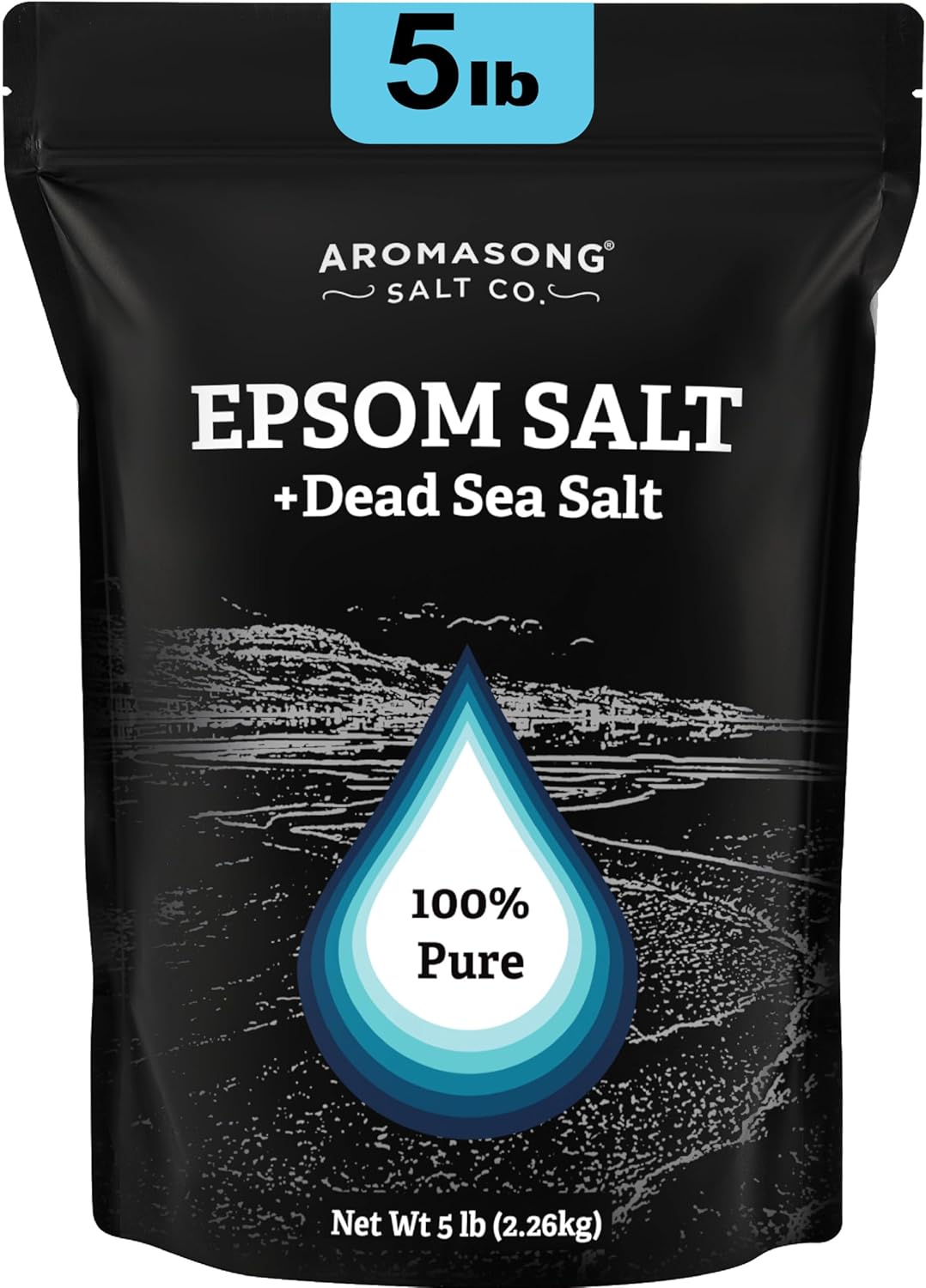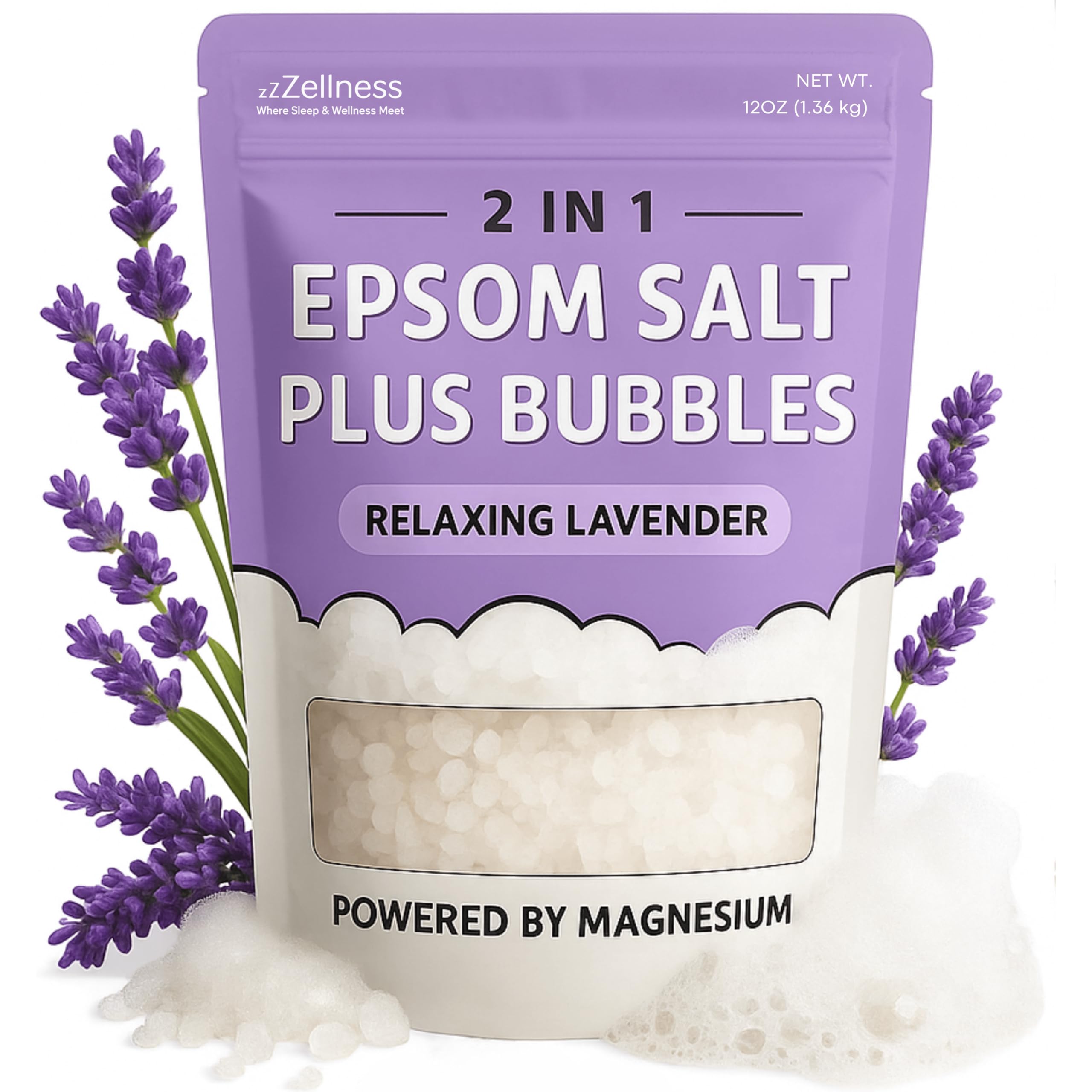Epsom salts have been used to treat aches and pains for hundreds of years. Whether you pulled a muscle while exercising or had your arthritis flare up, a good old soak in the tub will wipe the discomfort away.
Although pregnant women have used it for years, there is not a lot of research that could vouch for its complete safety. It isn’t listed as dangerous either.
There is nothing to worry about even if there is no scientific measurement of its effectiveness in relieving aches and pains.
What is Epsom Salt?
It is a crystallized version of magnesium and sulfate, two minerals that are naturally occurring.
And if you’re curious, it is not the same as bath salts. Although, it can come in packages mixed with colors, oils, and perfumes.
The reason it is called Epsom salt is it was discovered in a place in England bearing the same name. As mentioned earlier, it has been used for hundreds of years.
How is Epsom salt used?
When dissolved in water, Epsom salts break down into magnesium and sulfate. It is believed that your body absorbs these minerals through your skin.
Although there is a lack of scientific measurement, soaking in warm water with Epsom salts can relax muscles and loosen stiff joints.
Epsom salt baths have been used to treat the following:
- Bruises and sprains
- fibromyalgia – this is a condition that causes ligaments, muscles and tendons to hurt, plus it also causes tender points all over the body
- Insomnia
- Ingrown toenails
- Psoriasis – a disease that causes the skin to be itchy, red, and scaly
- Soreness resulting from diarrhea during chemotherapy
- Soreness resulting from a workout session
- Pain and redness caused by sunburn
- Swollen and tired feet
Despite the number of remedy claims, there isn’t enough science to back them up. Although most doctors agree that this kind of bath is safe, you can still check with your doctor if you have any concerns.
Benefits of Epsom salt baths during pregnancy
Pregnancy is a nine-month journey filled with all sorts of changes: a growing belly, changing breasts, and a series of aches and pains. But all niggles can be remedied by soaking in an Epsom salt bath.
Here are some of the benefits of doing so:
- It soothes the muscles. A lot of pregnant women suffer from leg cramps and rather than wait it out, a good soak in the tub might just help ease the discomfort. It can also help soothe sore muscles and ease back pain.
- It soothes the skin. It’s not just your belly that will grow or your breasts, your skin changes too! A lot of pregnant women will experience stretch marks, and a little Epsom salt bath can help if it hurts.
- It helps with digestion. Women who are carrying a child will often feel bloated and as a result, feel uncomfortable. Magnesium sulfate has been recommended for such issues because it aids in digestion and absorption of fluids.
- It reduces stress. Nursing mothers have said that soaking in an Epsom salt bath helped calm them down. Plus, it is believed that magnesium is a natural stress reducer.
- It replenishes salt. One of the health concerns in the US is magnesium deficiency. Epsom salt can replace what is missing in the diet, but it’s still best if you consult with a doctor first.
How to take an Epsom salt bath?
It doesn’t take long to dissolve Epsom salt in water. Plus, you can attend to some things before getting in for a good soak.
Here’s how to prepare an Epsom salt bath:
- Drop about two cups of Epsom salt into a warm bath.
- Allow it to soak for around 12 to 15 minutes.
- Make sure the water temperature is comfortable for you before getting in.
The last part is most important: Do not get into a tub that is boiling. This also means that you should avoid hot tubs during your pregnancy?
Why should that be the case? You want to avoid raising your temperature to high levels because it’s not good for your unborn child.
Have there been other uses for Epsom salts?
It has been used to treat preeclampsia in some women. A study on this was conducted and published in the British Journal of Obstetrics and Gynecology.
The women in the study were given intravenous magnesium sulfate to treat preeclampsia, which is a life-threatening condition that develops during pregnancies (but only a small number).
For the study, women around the world were given magnesium sulfate as a treatment for preeclampsia. The results showed that more than 15% reduced their risk.
Then again, there is evidence for the use of magnesium sulfate in the treatment of preeclampsia dating back to the 1900s. What the study did was back up its decade’s use as a treatment.
Be careful with what you use Epsom salts for
As mentioned above, Epsom salts can be used to treat digestive problems. But this requires you to consume it orally.
The use of Epsom salts has been deemed safe in baths, and consuming it is an entirely different matter. The best course of action is to seek the advice of your doctor first.
The pregnancy journey is a beautiful one, but it can also be tough. It is a nine-month period where you have to be extra careful about what you eat, and what you do.
Epsom salt baths have been deemed safe, but you can always talk to your doctor if you have any reservations.
Top Picks for Epsom Salt Bath Products
| Category | Product | Price | Score |
|---|---|---|---|
| 🎨 Best Aromatherapy Experience | ZZZELLNESS Lavender | $15.99 | 94/100 |
| 💰 Best Bulk Detox Blend | Aromasong Dead Sea | $23.97 | 90/100 |
| 🏆 Best Premium Magnesium | Ancient Minerals Flakes | $29.95 | 95/100 |
| 🎯 Best Fragrance-Free Relief | Dr Teal’s Pure | $4.97 | 92/100 |
| 🎁 Best Gift Set Variety | LOVERY Gift Basket | $39.99 | 89/100 |
| 💼 Best Budget Essential | Amazon Basics Salt | $3.37 | 90/100 |
How We Chose These Epsom Salt Bath Products
We focused on safety, quality, and suitability for pregnancy-related needs. Each product was evaluated based on ingredient purity, scent options, ease of use, therapeutic benefits like muscle relief and relaxation, and user feedback from pregnant or sensitive users. Price and value for the amount provided were also important to ensure you find trustworthy options that fit your budget. We avoided products with harsh additives or overwhelming fragrances to keep your experience gentle and comforting.
🎨 Best Aromatherapy Experience
If you’re looking to add a little spa magic to your bath, this lavender-scented Epsom salt soak makes it easy. The bubbles add that extra touch of luxury while the magnesium sulfate helps soothe sore muscles and melt away tension. It’s perfect for winding down after a long day or elevating your self-care routine. Plus, it’s gentle on your skin, so you can enjoy a calming, aromatic bath without any worries.
Whether you need a quick relax or a bedtime ritual, this pack fits right in.
Long-Term Savings
By using this foaming Epsom salt regularly, you might find fewer visits to massage therapists or less need for pricey relaxation products. It adds a bit of affordable self-care at home that goes a long way in helping you recharge.
Why You’ll Like It
- Soothes tired muscles and eases tension naturally
- Creates a foaming, bubbly bath for a relaxing vibe
- Infused with calming lavender for aromatherapy benefits
- Gentle on your skin with no harsh chemicals
- Dissolves quickly and works fast for immediate relief
Current Price: $15.99
Rating: 4.7 (total: 68+)
💰 Best Bulk Detox Blend
If you enjoy those long, relaxing baths that really help you unwind, this Aromasong blend is a great choice. It mixes classic Epsom salt with mineral-rich Dead Sea salt, which means you’re soaking in a ton of skin-loving goodness. You can use it after a busy day to ease sore muscles or as a gentle detox that’s safe enough for pregnancy baths. It’s unscented, so no overpowering smells—just pure, calming soak time.
Also, with a big 5-pound bag, you’re getting plenty to fill your tub again and again without feeling like you’re rushing through it.
Why It Saves You Money
Buying this in bulk means you won’t need to restock often, plus it doubles as a foot soak and full-body bath salt. That means less spending on multiple products and more time enjoying your downtime.
What You’ll Love
- Rich blend of Dead Sea and Epsom salts for maximum mineral benefits
- Help ease tired feet and muscles after a long day
- Unscented and gentle, great if you’re sensitive to fragrances
- Perfect for detox soaks that refresh your skin
- Bulk size means you get lots of relaxing baths for your money
Current Price: $23.97
Rating: 4.5 (total: 257+)
🏆 Best Premium Magnesium
These magnesium bath flakes bring something a bit different to your soak compared to regular Epsom salts. They dissolve quickly, leaving your bath silky smooth without any grit or residue.
You can use them for a full-body bath or just a foot soak after a long day. Since they’re fragrance-free and super pure, they’re gentle on your skin, which is great during pregnancy when you want to avoid anything harsh. Plus, the deep-source Zechstein magnesium makes them feel like a real treat, helping muscle tension melt away and giving you a natural way to relax and recharge regularly.
Smart Savings Over Time
Though they come at a higher upfront price, a little goes a long way with these flakes since they dissolve well and last through many baths. You won’t be replacing them as often as cheaper salts, making it a solid investment in your self-care routine.
Why You’ll Appreciate Them
- Quick-dissolving flakes for a smooth, residue-free soak
- Highly pure magnesium chloride for better absorption
- Gentle, unscented formula ideal for sensitive skin
- Great for muscle relief, stress reduction, and relaxation
- Versatile use for full baths or simple foot soaks
Current Price: $29.95
Rating: 4.8 (total: 20,887+)
🎯 Best Fragrance-Free Relief
If you’re looking for a simple, no-fuss Epsom salt soak, Dr Teal’s Pure Epsom Salt is a solid pick. It’s fragrance-free, so you don’t have to worry about any extra scents, which is especially nice if you want to add your own essential oils or prefer to keep things mild. The salt dissolves quickly in warm water, making your bath feel smooth and calming.
It’s great for relaxing tired muscles, unwinding after a long day, or just having a quiet moment to yourself. Plus, the 4-pound bag goes a long way, so it’s easy to keep on hand for regular baths or when you need quick relief from pregnancy aches.
Why It’s Worth It
With a price that fits most budgets and a size that lasts, this Epsom salt saves you from constantly restocking. A little bit goes a long way, so you get a dependable, fragrance-free option without breaking the bank over time.
What You’ll Love
- Fragrance-free for sensitive noses or customized scents
- Made with pharmacy-grade magnesium sulfate for muscle relief
- Fast-dissolving ultra-fine crystals for a smooth soak
- Perfect for easing aches, stress, and softening skin
- Comes in a convenient 4 lb resealable bag
Current Price: $4.97
Rating: 4.8 (total: 8,197+)
🎁 Best Gift Set Variety
If you want to treat yourself or someone special to a spa-like bath at home, this variety pack from LOVERY hits the spot. You get six different scents—from soothing lavender to zesty lemon basil—all beautifully packaged in a sleek marble and gold box.
Each jar is packed with Epsom salt plus added goodies like jojoba oil, shea butter, and vitamin E, so your skin feels nourished while you soak. It’s also super handy because you can use the salts for a relaxing bath or even as a shower scrub to refresh your skin.
Whether it’s for everyday self-care or a thoughtful gift, this set makes those quiet moments in the tub feel a little more special.
Why It Makes Sense
Instead of buying single scents separately, this gift set offers a bundle of premium salts that last through multiple baths. It’s a cost-effective way to enjoy a variety of relaxing experiences without needing to restock often.
Plus, the gift-ready packaging means you save time and effort if you’re looking for a present.
What You’ll Enjoy
- Six unique scents including lavender, eucalyptus, and honey almond
- Infused with essential oils, shea butter, jojoba oil, and vitamin E
- Fast-dissolving salts that soften skin while you relax
- Comes in an elegant gift box with a wooden scoop included
- Vegan-friendly, paraben-free, and cruelty-free
Current Price: $39.99
Rating: 4.6 (total: 713+)
💼 Best Budget Essential
This simple, no-frills Epsom salt from Amazon Basics is just what you need for a relaxing soak without any fuss. Since it’s unscented, you have the freedom to add your favorite essential oils if you want a personal touch. Whether you’re winding down after a busy day, easing muscle tension post-workout, or just giving your feet some love, this salt does the trick.
The resealable bag keeps it fresh and makes storage easy, plus the 3-pound size feels like it lasts forever, so you’re set for many baths to come. It’s an easy, dependable choice when you want quality without stretching your budget.
Smart For Your Wallet
Because it comes in a generous 3-pound bag, you’re getting plenty of Epsom salt at a price that won’t make you think twice. You won’t need to buy frequently, and since it’s unscented, you avoid paying extra for added fragrances you might not want. It’s a solid pick if you want to stick to your wellness routine without breaking the bank.
Why You’ll Like It
- Fragrance-free, so you can customize your bath with your favorite oils
- Quick-dissolving granules that leave muscles feeling relaxed
- Resealable bag keeps salt fresh and convenient to use
- Great for both full baths and targeted foot soaks
- Budget-friendly without compromising on effectiveness
Current Price: $3.37
Rating: 4.8 (total: 11,598+)
FAQ
Is It Safe To Take Epsom Salt Baths During Pregnancy?
You might wonder if soaking in Epsom salt baths is safe while pregnant. Generally, warm baths with Epsom salt can be safe if you follow some simple precautions. Make sure the water temperature is comfortably warm, not hot, to avoid overheating, which can be risky during pregnancy. It’s best to limit your soak time to about 15–20 minutes and avoid deep soaking that covers your belly if you feel uncomfortable.
Also, always check with your healthcare provider before trying any new bath products. If you experience any unusual symptoms like dizziness, cramping, or swelling, stop immediately and consult your doctor.
Using gentle, unscented or mild lavender-scented epsom salts like ZZZELLNESS Epsom Salt Plus Bubbles at $15.99 can add relaxation benefits without overwhelming fragrances.
How Do I Choose The Best Epsom Salt Product For Pregnancy?
When picking an Epsom salt product, especially during pregnancy, you want to focus on purity and gentleness. Look for products that are free from harsh chemicals, additives, or strong fragrances, since your skin can be more sensitive now.
For example, options like Dr Teal’s Fragrance Free Epsom Salt Soak priced at $4.97 are excellent because they’re simple, pure magnesium sulfate without scent, making them less likely to irritate your skin or trigger sensitivity. If you enjoy mild aromatherapy, lavender-scented versions such as the ZZZELLNESS bath soak add a calming touch without being overpowering.
Avoid blends with essential oils or herbs you haven’t tested before, and always do a patch test to be safe.
What Are The Best Practices For Using Epsom Salt Baths Safely During Pregnancy?
To maximize safety and benefits during pregnancy, start by filling your bathtub with warm, not hot water. Add the recommended amount of Epsom salt—usually around 1 to 2 cups per bath.
Soak for about 15 to 20 minutes and listen to your body; if you feel dizzy, overly hot, or uncomfortable, get out immediately. Avoid daily long soaks to reduce any risk of dehydration or skin dryness.
It’s a good idea to hydrate well before and after your bath. After soaking, gently pat your skin dry and apply a moisturizer to keep your skin hydrated.
You can try different brands like Aromasong Epsom Salt with Dead Sea Salt at $23.97 if you want added detox benefits, but stick to unscented or mild options during pregnancy. Lastly, always consult your healthcare provider if you have any complications or questions.
Wrapping Up
To support your pregnancy journey, safe and soothing Epsom salt baths can offer significant benefits like muscle relaxation, stress relief, and skin nourishment. Choosing the right product means looking for gentle formulas without harsh chemicals or potent scents. Our picks highlight varied options—from premium magnesium flakes and scented aromatherapy to budget-friendly unscented salts and luxurious gift sets so you can select what fits your preferences and needs.
By incorporating these baths into your routine, you can create restful, healing moments that help you feel your best during this special time.
| Product | Image | Rating | Price | Package Dimensions | Recommended Uses |
|---|---|---|---|---|---|
| Epsom Salt Plus Bubbles – Lavender Scented |  | 4.7/5 (7 reviews) | $15.99 | 9.06 x 5.35 x 1.81 inches; 12 ounces |
|
| Aromasong Epsom Salt with Dead Sea Salt |  | 4.5/5 (10 reviews) | $23.97 | 12.64 x 6.85 x 3.23 inches; 5 pounds |
|
| Ancient Minerals Magnesium Bath Flakes |  | 4.8/5 (14 reviews) | $29.95 | 4.76 x 10.59 x 15.04 inches; 8 pounds |
|
| Dr Teal’s Epsom Salt Magnesium Soak |  | 4.8/5 (12 reviews) | $4.97 | 7.25 x 3 x 10.75 inches; 4 pounds |
|
| Epsom Bath Salts Gift Basket Set |  | 4.6/5 (8 reviews) | $39.99 | 7.44 x 5.11 x 2.86 inches; 4.23 ounces |
|
| Amazon Basics Epsom Salt Soak |  | 4.8/5 (9 reviews) | $3.37 | 3.75 x 5.75 x 9 inches; 3.01 pounds |
|
This Roundup is reader-supported. When you click through links we may earn a referral commission on qualifying purchases.








